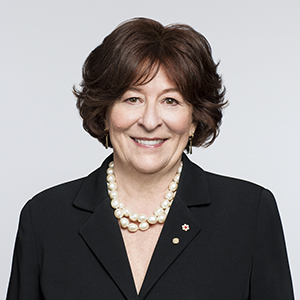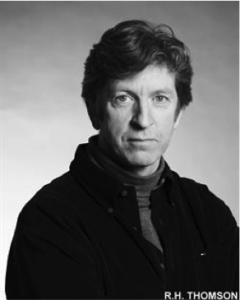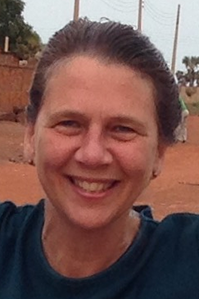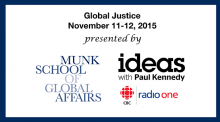Global Justice is rooted in the aspiration to make the world a better place. It seeks to help us understand how human beings – no matter who they are or where they live – can be treated fairly.
But who decides what justice really is? And what happens when human values and interests collide? IDEAS in partnership with the Munk School of Global Affairs at the University of Toronto present a new two-part series about these very tough issues confronting all of us today.
Wednesday November 11, 2015, Part 1: Justice across Borders
The images are stark: an endless stream of men, women and children, many claiming to be refugees, trying desperately to reach Germany from the Middle East, Africa, South Asia and Southeast Asia. And these recent events barely touch the problem. There are more than 60 million migrants in the world today, the largest number since the end of WW2. The causes are myriad: war, persecution, economic collapse, or lack of opportunities for migrants and for their children. But should all migrants be treated equally? And where does our obligation to help begin...and end?
The Honourable Louise Arbour, former justice of the Supreme Court of Canada, former UN High Commissioner for Human Rights and international prosecutor of war crimes, Michael Blake, Professor of Philosophy and Public Affairs, and Director of the Program on Values in Society at the University of Washington, Catherine Dauvergne, Dean of the Peter A. Allard School of Law at University of British Columbia, and moderator Stephen Toope, Director of the Munk School of Global Affairs untangle the moral, legal, economic and political arguments that inform what we think and do about cross-border human migration.
Thursday November 12, 2015, Part 2: Protecting Human Rights in a World of Conflict
It is commonly argued that one of the greatest political and legal achievements of the 20th century was the creation of “human rights” in international law. At the same time, another body of international criminal law emerged: individual liability for war crimes and crimes against humanity. Today, we’re also concerned about human trafficking and child labour. But with the international institutions that are now in place, is global justice being served in a meaningful way?
The Honourable Louise Arbour, former justice of the Supreme Court of Canada, former UN High Commissioner for Human Rights and international prosecutor of war crimes, Catherine Dauvergne, Dean of the Peter A. Allard School of Law at UBC, Elly Vandenberg, Senior Director, World Vision Canada, and moderator Stephen Toope, Director of the Munk School of Global Affairs, probe the interplay among human rights, politics and our international justice system.
About the Speakers
EVENT HOST
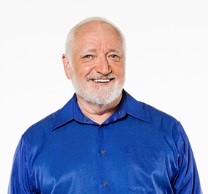 Paul Kennedy has been the host of IDEAS since 1999, when he succeeded the legendary Lister Sinclair. But Paul’s association with the program goes back more than thirty years, to 1977. He has won national and international recognition for his work, including an ACTRA award for best Canadian radio documentary for a program called, War on the Home Front, co-authored with Timothy Findley; the B’nai Brith Media Human Rights Award for a series called, Nuremberg on Trial; an Armstrong Award presented by Columbia University. In 2005, he was awarded the Woods Hole Oceanographic Institution Special Citation for Excellence in Ocean Science Journalism for his eight-part series, “Learning from the Oceans”.
Paul Kennedy has been the host of IDEAS since 1999, when he succeeded the legendary Lister Sinclair. But Paul’s association with the program goes back more than thirty years, to 1977. He has won national and international recognition for his work, including an ACTRA award for best Canadian radio documentary for a program called, War on the Home Front, co-authored with Timothy Findley; the B’nai Brith Media Human Rights Award for a series called, Nuremberg on Trial; an Armstrong Award presented by Columbia University. In 2005, he was awarded the Woods Hole Oceanographic Institution Special Citation for Excellence in Ocean Science Journalism for his eight-part series, “Learning from the Oceans”.
MODERATOR
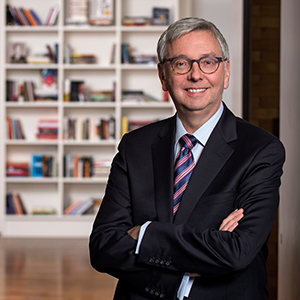 Professor Stephen J. Toope is Director of the Munk School of Global Affairs. Before joining the Munk School in January 2015, Professor Toope was President of the University of British Columbia from 2006 to 2014. He represented Western Europe and North America on the UN Working Group on Enforced or Involuntary Disappearances from 2002-2007. He continues to conduct research on many aspects of international law and is currently working on issues of continuity and change in international law, and the origins of international obligation in international society. Before joining UBC, Toope was President of the Pierre Elliott Trudeau Foundation, and Dean of Law at McGill. A Canadian citizen, Professor Toope earned his PhD from Trinity College, Cambridge, his degrees in common law (LLB) and civil law (BCL) with honours from McGill University, and graduated magna cum laude with his AB in History and Literature from Harvard University.
Professor Stephen J. Toope is Director of the Munk School of Global Affairs. Before joining the Munk School in January 2015, Professor Toope was President of the University of British Columbia from 2006 to 2014. He represented Western Europe and North America on the UN Working Group on Enforced or Involuntary Disappearances from 2002-2007. He continues to conduct research on many aspects of international law and is currently working on issues of continuity and change in international law, and the origins of international obligation in international society. Before joining UBC, Toope was President of the Pierre Elliott Trudeau Foundation, and Dean of Law at McGill. A Canadian citizen, Professor Toope earned his PhD from Trinity College, Cambridge, his degrees in common law (LLB) and civil law (BCL) with honours from McGill University, and graduated magna cum laude with his AB in History and Literature from Harvard University.
Panelists
The Honourable Louise Arbour, C.C., G.O.Q. was appointed to the Supreme Court of Ontario in 1987 and the Court of Appeal for Ontario in 1990. In 1996, the Security Council of the United Nations appointed Ms. Arbour as Chief Prosecutor for the International Criminal Tribunals for the former Yugoslavia and Rwanda where she attempted to build what she called a “law enforcement agency” for human rights. In this role, she secured the first conviction for genocide (Rwanda) since the 1948 Genocide Convention and the first indictment for war crimes by a sitting European head of state (Serbian President Slobodan Milosevic). She resigned to take up an appointment to the Supreme Court of Canada in 1999, was appointed High Commissioner for Human Rights at the United Nations in 2004, and took over as President and CEO of the International Crisis Group in 2009. She is currently a jurist in residence at Borden Ladner Gervais LLP in Montreal and a member of the Advisory Board of The Coalition for the International Criminal Court, the Global Commission on Drug Policy, and the International Commission Against the Death Penalty
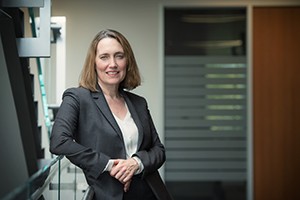 Catherine Dauvergne took up the deanship at the Peter A. Allard School of Law at University of British Columbia on July 1, 2015. Dauvergne is a UBC Law alumna and completed her PhD in Law at the Australian National University. Dauvergne is a member of the Law Society of BC, she has been working in the area of refugee, immigration, and citizenship law for twenty years. In 2012, Dauvergne was named a Fellow of the Trudeau Foundation in recognition of her contributions to public discourse in Canada. Dauvergne has published extensively including six books and more than 60 articles. Her next book entitled The New Politics of Immigration and the End of Settler Societies will be published by Cambridge University Press in 2015.
Catherine Dauvergne took up the deanship at the Peter A. Allard School of Law at University of British Columbia on July 1, 2015. Dauvergne is a UBC Law alumna and completed her PhD in Law at the Australian National University. Dauvergne is a member of the Law Society of BC, she has been working in the area of refugee, immigration, and citizenship law for twenty years. In 2012, Dauvergne was named a Fellow of the Trudeau Foundation in recognition of her contributions to public discourse in Canada. Dauvergne has published extensively including six books and more than 60 articles. Her next book entitled The New Politics of Immigration and the End of Settler Societies will be published by Cambridge University Press in 2015.
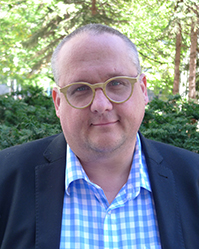 Michael Blake is a Professor of Philosophy and Public Affairs; he is also the Director of the University of Washington’s Program on Values in Society. He received his bachelor degree in Philosophy and Economics from the University of Toronto, and a PhD from Stanford University. He obtained some legal training at Yale Law School, before running away to become a philosopher. Blake writes on immigration and global justice; he is the author of Justice and Foreign Policy (Oxford, 2013) and, with Gillian Brock, of Debating Brain Drain: May States Restrict Emigration? (Oxford, 2014). He was previously a faculty member at Harvard University’s John F. Kennedy School of Government. His current work focuses on migration, and on the relationship between the democratic rights of citizens and the rights of prospective migrants.
Michael Blake is a Professor of Philosophy and Public Affairs; he is also the Director of the University of Washington’s Program on Values in Society. He received his bachelor degree in Philosophy and Economics from the University of Toronto, and a PhD from Stanford University. He obtained some legal training at Yale Law School, before running away to become a philosopher. Blake writes on immigration and global justice; he is the author of Justice and Foreign Policy (Oxford, 2013) and, with Gillian Brock, of Debating Brain Drain: May States Restrict Emigration? (Oxford, 2014). He was previously a faculty member at Harvard University’s John F. Kennedy School of Government. His current work focuses on migration, and on the relationship between the democratic rights of citizens and the rights of prospective migrants.
Acclaimed Canadian stage and screen actor RH Thomson (Reader), was awarded in 2015 the very prestigious Governor General’s Performing Arts Award for Lifetime Artistic Achievement, and last year, was the recipient of the 2014 ACTRA Toronto Award of Excellence. He was made a Member of the Order of Canada in 2010 and was awarded an Honorary Doctorate from the University of Toronto, Trinity College. Recently, Mr. Thomson directed The Crucible at Theatre Calgary and filmed guest star roles in the Showcase series King, the CBC series’ Republic of Doyle and Cracked and starred opposite Toni Collette and Michael Sheen in Dennis Lee’s feature film Jesus Henry Christ.
Elly Vandenberg, Senior Director, World Vision Canada, is one Canada’s foremost advocates for children and has been a tireless champion for global development for more than 25 years. She leads World Vision Canada’s advocacy team which provides an important voice for children around the world. Her expertise has influenced the Government of Canada’s approach to international development, including its landmark decision to invest in maternal, newborn and child health as well as its commitment to address human trafficking. Elly specializes in peace-building and human rights based on extensive hands-on experience in Latin America. She holds a B.A. in international development from the University of Toronto, specialist certificates in voluntary sector management and a professional certification in coaching.
